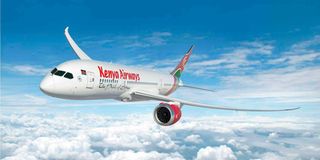Premium
State-backed KQ loan rises by Sh2bn on weak shilling

A State-guaranteed loan tapped by Kenya Airways from the US Export-Import Bank ballooned by Sh2.08 billion in April.
A State-guaranteed loan tapped by Kenya Airways from the US Export-Import Bank ballooned by Sh2.08 billion in April due to the weakening of the shilling against the dollar, underlining the impact of the wobbly local currency on public debt.
Fresh data from the Treasury shows the US-dollar-denominated debt which was taken over by the State last year hit Sh79.09 billion in April, a 2.7 percent increase from Sh77.01 billion in March.
During the period, the Kenya shilling depreciated against the US dollar by 2.7 percent, the Euro by 3.7 percent, Yen by 1.8 percent, Yuan by 1.9 percent, and Sterling Pound by 3.5 percent.
The national carrier defaulted on part of the $525 million loan from the Private Export Funding Corporation (Pefco), which was guaranteed by the US Exim Bank initially, and later by Kenya.
The KQ loan was a 12-year facility originally provided by Citi Bank and JP Morgan before Pefco took it over, with the US Exim Bank and the Kenyan government joining as guarantors.
The airline took out a loan in 2017 to buy aircraft but defaulted on repaying it after facing financial difficulties, forcing the government to take over the repayment as part of its guarantee.
In the three months to March, the government paid Sh7.3 billion after the US Exim Bank handed a default notice to Kenya following the delayed payment of the guaranteed loan.
The fluctuation of the shilling is, however, taking a toll on the country’s external debt servicing costs, with Kenya’s public and publicly guaranteed debt denominated in the aforementioned five major currencies.
Overall, the government’s external debt stock increased by Sh241.41 billion from Sh4.851 trillion in March 2023 to Sh5.092 trillion in April 2023.
“This was attributed to disbursements made during the month and the exchange rate depreciation,” said the Treasury.
KQ more than doubled its loss from Sh15.87 billion to Sh38.26 billion for the financial year ended December 2022.
This comes at a time the International Monetary Fund (IMF) is pushing for drastic reforms at the company to wean the airline off government bailouts by December this year to reduce the burden on taxpayers.
The IMF insists the optimal strategy for turning around the struggling airline should be based on the least cost to the exchequer.
“While KQ made progress under its business reorientation plan with a focus on cost savings (for example, fleet and route optimisation, other cost management), it faced difficulty in negotiating the collective bargaining agreements. The authorities are seeking Cabinet advice on an optimal strategy on KQ with the least fiscal impact to the government,” said the IMF last week.





